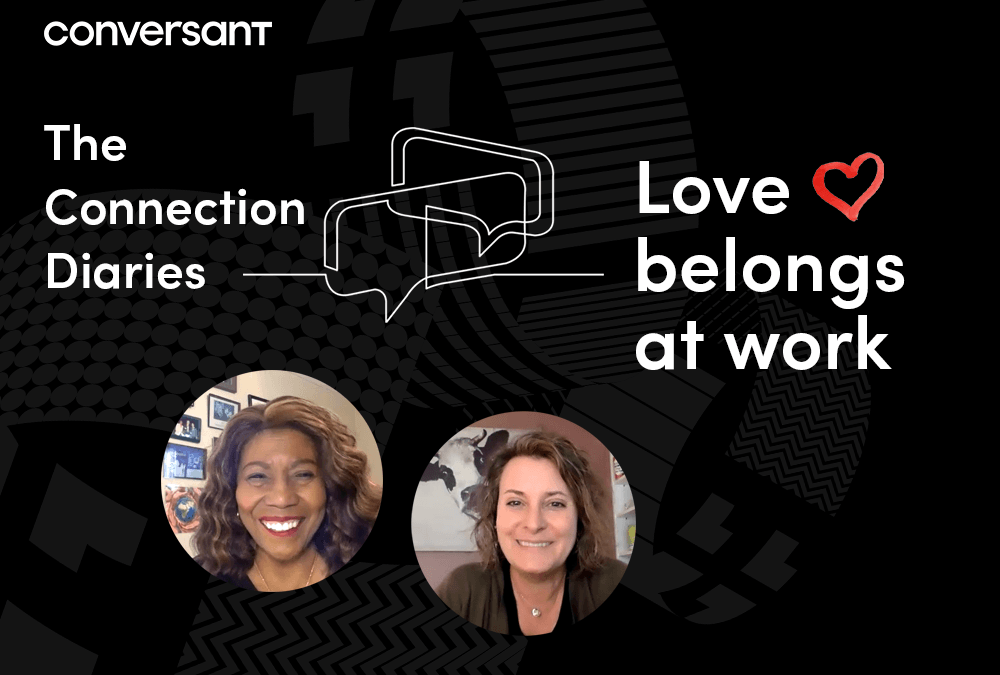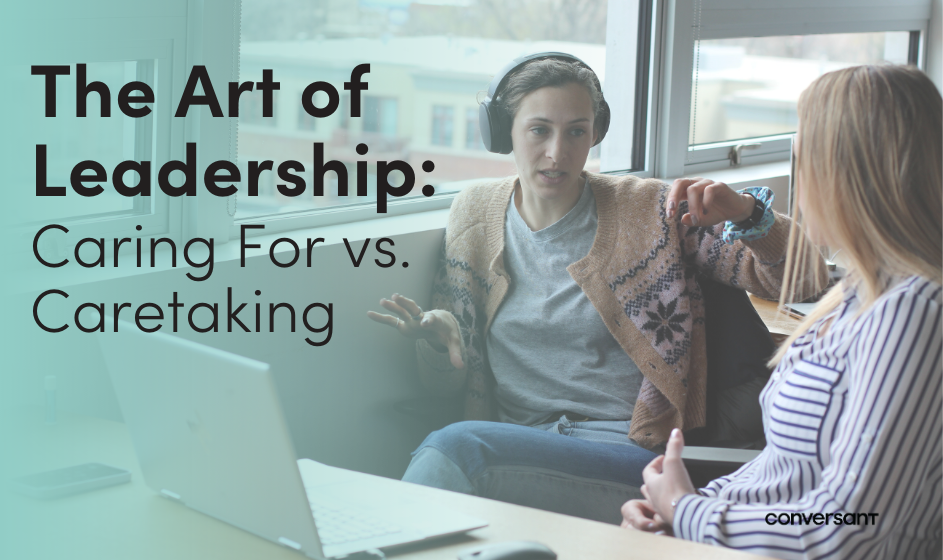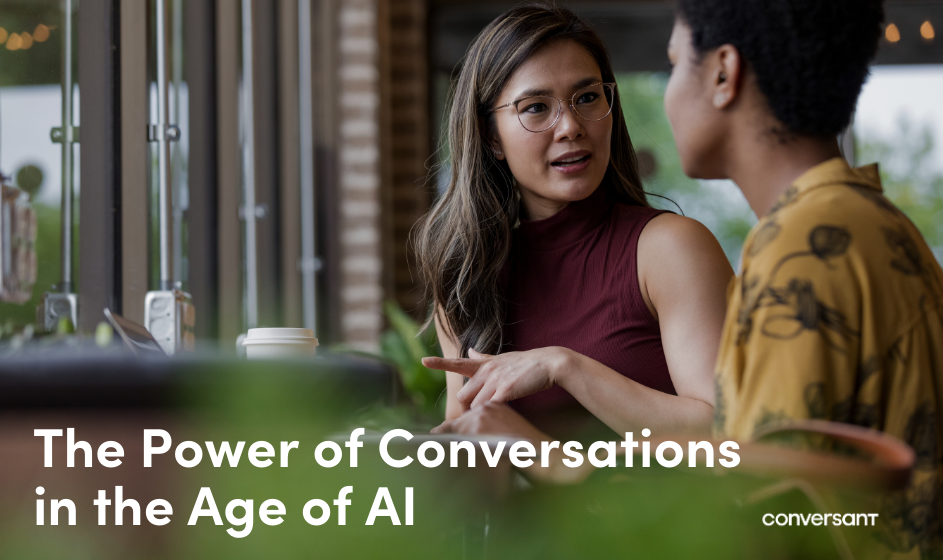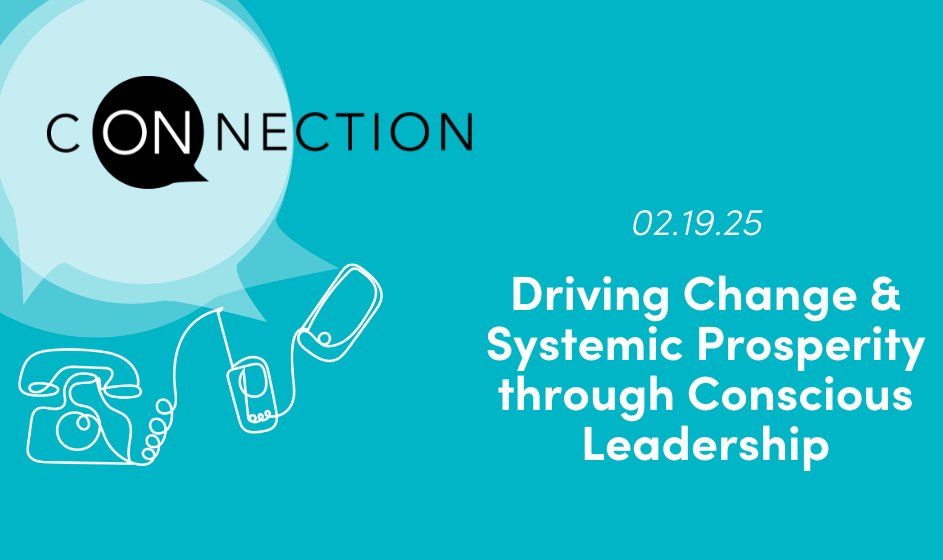Michele Hunt, author, strategic advisor, and founder of DreamMakers, joined Conversant CEO Robin Anselmi to talk about #LOVE.
For nearly 30 years we’ve partnered with leaders and organizations to help them work through their biggest challenges, achieve their most important strategic goals, and evolve to meet the demands of a fast-changing world. Over those decades we’ve held a simple but important truth at the core of everything we do: we’re all still human beings at work, and when we design our conversations and our systems with that in mind, everyone is more vital, productive and connected.
A few years back Robin talked about Love as “the most human of resources.” Love is a normal, natural, empowering human emotion and yet we don’t talk about it at work. Why is it so hard?
As Robin and Michele share, there is a history that explains our traditional separation of work and personal life, and with it a separation of a worker’s results and their emotional and social world. That history has also encouraged a model of fear and domination as an operating system for getting things done. It is well known that fear is a contracting force, so if we’re hoping for growth why would we let fear lead?
COVID-19 has turned everything upside down, including organizational structure as businesses have had to trust and empower their employees to get work done remotely. Collectively we’ve also had to wake up to how interconnected and interdependent we are. What if those connections were built on something other than fear, something expansive and liberating?
It may sound like a dream, but we’re committed to making it a reality for ourselves and the organizations we partner with. If you’re of the same mind we would love to connect with you—send us a note or connect with us on LinkedIn.
Full Transcript
Robin: Hello everyone, welcome to this month’s edition of the Connection Diaries. I am Robin Anselmi of Conversant, and I’m joined today by my dear friend, colleague, and guide, Michele Hunt, founder of Dream Makers. Hi Michele.
Michele: Hi, it’s my pleasure to be here and talk about my number one favorite topic.
Robin: And what is your number one favorite topic these days?
Michele: Hashtag love.
Robin: Yeah Michele, you and I have both been on a kick about love in the workplace, love and leadership. And the conversation we were just having that I think is really interesting is, what makes that so darn hard for organizations to talk about? We know that it is a normal natural empowering human emotion, and yet we don’t talk about it at work, and I love your perspective on that. So, why do you think it’s so hard for us to do?
Michele: I think it’s hard for us to do, period. I think it’s hard for us to do in personal relationships, and I also believe that we have come from—we’ve been taught that words like love and joy don’t belong at work. And so, I’ve—you know, we’ve been historically taught that love is—I mean, work is an environment that you really pursue your job, your perfection, the results, but it’s not about the human connections when in fact, the human connections are what makes productive, creative, successful work.
Robin: Yeah. Well, and I—you know I—in the conversation we were having just a few minutes ago, the thing I love you said was how much our organizations today are really driven by fear and domination sort of as the operating system, right, as the way that work gets done, and how much we’ve seen evolve, particularly throughout COVID, of people having to actually really entrust and empower people—you know, which sort of runs counter to that fear and domination perspective.
Michele: Yeah. Yeah, COVID has turned everything upside down and we—one, we had to rely on people’s creativity; we’ve had to trust people. Historically, you know, organizations are built on fear, you know? So their rules and regulations and all of those are the basic assumptions that people are basically bad, can’t be trusted, have limits on their growth, you know, and are self-initiators. Well, with COVID, we’ve had to trust that people can go home, that they can be driven by the goals and aspirations that collectively we’re trying to create. And so, it’s given people a better picture of human capacity than the old structures that we put them in, the boxes we put them in, the job descriptions we put them in which were constrictive, you know, versus liberating. And love is liberating.
Robin: Love is liberating, yes. Do you think it’s also that these times have really shown a—shined a light on how interdependent we all are within our organizations? I think we maybe knew that before, but do you think that that’s the other thing that’s been happening, is that we actually really see those interdependencies so much more starkly now than we might have 18 months ago?
Michele: Oh, I think it’s been coming, but I think that COVID really was—put it right in our face. You know, you cannot separate people from communities, from—
[Barking]
Michele: Sorry about my puppy
Robin: That’s life.
Michele: There’s no perfection, right?
Robin: Right.
Michele: That’s another thing, you know, so yes, I think that this to you—to answer your questions, it puts it—it makes it very visible it made the—kind of what’s invisible very visible, that we are interdependent, that we… we’re interdependent in our own homes, you know, on delivery services, on—the whole structure of our—the way we viewed life has changed. Now, how that impacts work, it’s the same thing. You know we’ve had to get highly creative, and to do that, we had to come out of our boxes, and coming out of our boxes gave us the opportunity to see people’s potential, to call on them to do different things in different ways.
Robin: What would you say today to the leader or the executive who says, like, “Love’s too soft. I’m not—I can’t build that into my organization.” What would be your response to that person today?
Michele: Well, a lot of leaders, or people, think of love from the intimate standpoint or from the close, compassionate, family circles, but I would say to that leader that love is energy. Everything is energy, but love is a liberating energy. It’s the kind of energy, the most powerful energy, the most transcendent energy in the universe. Scientists are discovering it. So, with that energy, we need—it’s the energy that if you take the it out of the genies bottle, it will unleash creativity. It will increase commitment, and it will generate a culture and a momentum that is extraordinary for achieving individual and collective results, so I would—you know, I would say that it… You know, love expands and fear, the way we’re running our organizations now, or the idea of, you know, hierarchy, or superiority and inferiority, or boss, and that all of those restrictive kind of assumptions that we have about work and people and life, they’re not sustainable. It’s not… you can’t—we’ve already seen the cost of that. We’ve seen the cost of that at work, we’ve seen the cost of that in our environment, we’ve seen the cost to that through COVID, we’ve seen the cost of that in the racial unrest, we—and in our nation that, you know the capital being—that is fear and hate. And I hate—I hate to say it, but our organizations are built on fear, and the belief that some people are superior and some are inferior, and… perfection. Instead of being built on systems designed for breathing, living human beings who all have the—as in Robin’s word, have the powerful longing to be loved.
Robin: Yeah. Right, I think for me, the thing that really jumps out, right, is that fear contracts, right, so we know this about beings, right, that fear does tend to contract, and that love expands. And so, for all—for us as people, as individuals, for our organizations, if you want growth, love is actually the fuel for that, right, so how do you actually create safe spaces for people to love and grow together and really nurture those interdependencies? So, I think if we want to get out of sort of the scarcity mindset and really move towards abundance, and I—in all of our organizations, it’s going to take a loving mindset from our leaders to create the places for people to grow and make the contributions they want to make and have the kind of joy they want to have in their work.
Michele: Yeah, I think I told you earlier that what drew me to Conversant was the fact that you could feel that energy. I could feel the energy from everyone I talked to, and that energy is love. I could feel that. I mean, it’s… palpable. And so when I met Anne, I could feel that. I could sense it in our conversations; our conversations came out of a respect and a nurturing of not only human connections but even the deeper love connections, so that, you know, I felt safe. And then, when I came in and started working with you folks for the last six months, I saw you struggle with really pushing the boundaries to the point where you said, no, love is a core value. It’s a promise that we have to have if we believe that joy and human connection really is the powerful force for organizations to create extraordinary things. And I saw you folks individually and collectively come together, and it wasn’t—you know, it was a lot of debate—but it—but that trusting something called love made it safe for all of your people, all of—from all around the world to have that conversation and feel free to contribute their wildest idea about it. And what you came up with was a beautiful vision and values. I mean, come on, authenticity—can’t have authenticity without love. Community—what makes community? An energy of love. Wonder—wonder is—talk about expansive, and love expands and hate contracts, or fear contracts. So wonder, your—I love you guys’ statement, we always want our best days ahead of us, or our best day ahead of us. That is love energy, and it’s a powerful force. Difference—you have to have fundamental love in your heart and your soul and your mind to really have the empathy and understanding and of valuing differences and understanding it, that if you bring those differences together, you’ll have brilliant results. You’ll have brilliant ideas, and then you actually named one of the promises—love! And I love that.
I love that, and so you know, it’s—it’s why I work I chose to work. Love was the attractor for me to Conversant. And you’re the reason, Robin, that I’ve taken that next bold step to overtly write about it, that love as a core leadership value, and as an organizing principle for all organizations in society—businesses in society. And it’s because of, you know, watching you and listening to you and experiencing the people at Conversant. I mean, I’ve cried with your people, and I felt safe to do that because it was a loving kind of environment. It was a loving place and space when I was—and we’re on zoom! Okay, and yet that love that transcends, you know, the airwaves.
Robin: Michele Hunt, you and I could spend the rest of our evening talking about love, I think. I just want to say thank you for joining us. Everybody thanks for joining us for this month’s Connection Diary. I would challenge all of you, if you if growth and abundance are important for your business, start thinking about, what’s the place that love takes up in your leadership and in your organizations? Rhanks everybody. Have a great day.




